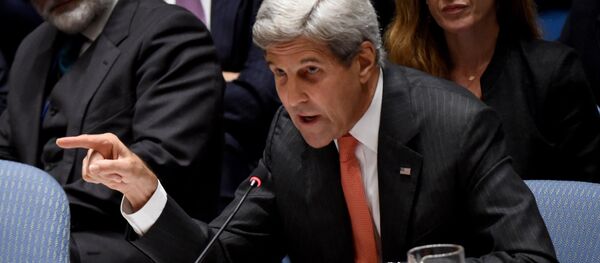"It is most likely that during his negotiations with Sergei Lavrov, US Secretary of State John Kerry made serious concessions on behalf of the US administration, which were not welcomed by Pentagon generals," Sotnikov said in his interview with RT news channel.
"It was practically immediately followed by the US aircraft attack on the Syrian army positions at Deir ez-Zor," he added, explaining that it only proves that the left hand in Washington has no idea what the right one is doing at the moment.
"I think that in the light of the recent developments, there will be no UN resolution in support of a vote for the Lavrov-Kerry agreements and Russia will not insist on one," the expert suggested.
He further explained that an issue is taken off the agenda when the members of the UN Security Council do not understand what the document is all about. In this particular case, the US is reluctant to reveal the details of the agreement.
Sergei Balmasov, Senior Analyst of the Centre for Crisis Society Studies, Expert of the Middle East Institute of the Russian International Affairs Council (RIAC) explained to RT that there are several decision-making centers within the US military command.
"Throughout the first week of the Syrian ceasefire the opposition group in Aleppo has strengthened and attempted to launch an assault which immediately resulted in the failure of the agreements reached in Geneva," the expert said.
Balmasov however warned against any possible delusions, explaining that Washington is far from orchestrating and controlling the processes which are taking place on the territories not controlled by Damascus.
"The revealing of some particular details of the ceasefire agreement may drive a deeper wedge between the Americans and their allies in the region, first of all, Saudi Arabia, Qatar and Turkey," he explained.
Meanwhile in his recent interview with Associated Press, Syrian President Assad said that the US "has no will" to join Russia in its fight against terrorists in Syria.
BREAKING: Syrian president in AP interview says US "doesn't have the will" to join Russia in fighting militants in Syria.
— The Associated Press (@AP) 22 сентября 2016 г.
The ceasefire agreement, he said, is "not about Syria or Russia; it's about the United States and the terrorist groups that have been affiliated to ISIS (Daesh) and al-Nusra and al-Qaida, and to the United States and to Turkey and to Saudi Arabia."
"They announced publicly that they are not committed, and this is not the first attempt to halt operations in Syria. The first attempt was in last February, and didn't work, I think, because of the United States, and I believe that the United States is not genuine in regards to a cessation of violence in Syria," said Syria's legitimate leader.
"The United States doesn't have the will to work against al-Nusra or even ISIS, because they believe that this is a card they can use for their own agenda," he explained.
"If they attack al-Nusra or ISIS, they will lose a very important card regarding the situation in Syria. So, I don't believe the United States will be ready to join Russia in fighting terrorists in Syria," Bashar Assad stated.
EXCLUSIVE: Syrian President Assad says US airstrikes on Syrian troops in east were 'definitely intentional' https://t.co/Ig7EN2pWv2
— The Associated Press (@AP) 22 сентября 2016 г.
Vladimir Sotnikov however said that he "looks with optimism at the prospects of Russian-American cooperation in Syria."
"It is the war of nerves and words," he said.
"The terrorist groups used the cessation of hostilities to re-group and disrupt the evolving Russian-American partnership in Syria," he explained, adding that the real steps on improvement of the cooperation between the two countries on the situation in Syria will be made only after the new president takes office in the White House.
"The peaceful settlement of the conflict gets even more complicated due to the constantly changing situation on the ground in Syria," he explained, adding that it will further depend on what is going on along the frontline in the country.
Meanwhile Sergei Balmasov was more skeptical.
"The Americans are trying to seize the initiative from Russia," he told RT.
"The US continues playing hardball and forming several power centers in the country, a so-called Syria 'parallel to legitimate authorities'.
BREAKING: Syrian president says in AP interview US airstrikes on Syrian troops were "intentional," lasted for nearly one hour.
— The Associated Press (@AP) 22 сентября 2016 г.
"If only a while ago it seemed that the Lavrov-Kerry agreements were quite implementable, now they have come under serious question: do the countries with such a sharp discrepancy of interests really need them," the political analyst wondered.
He further explained this "sharp discrepancy": Russia's aim is the support and maintenance of the legitimate government of Bashar Assad.
While the aim of the US – to de-scope the areas under his control to a small area and to create an alternative Syria.





